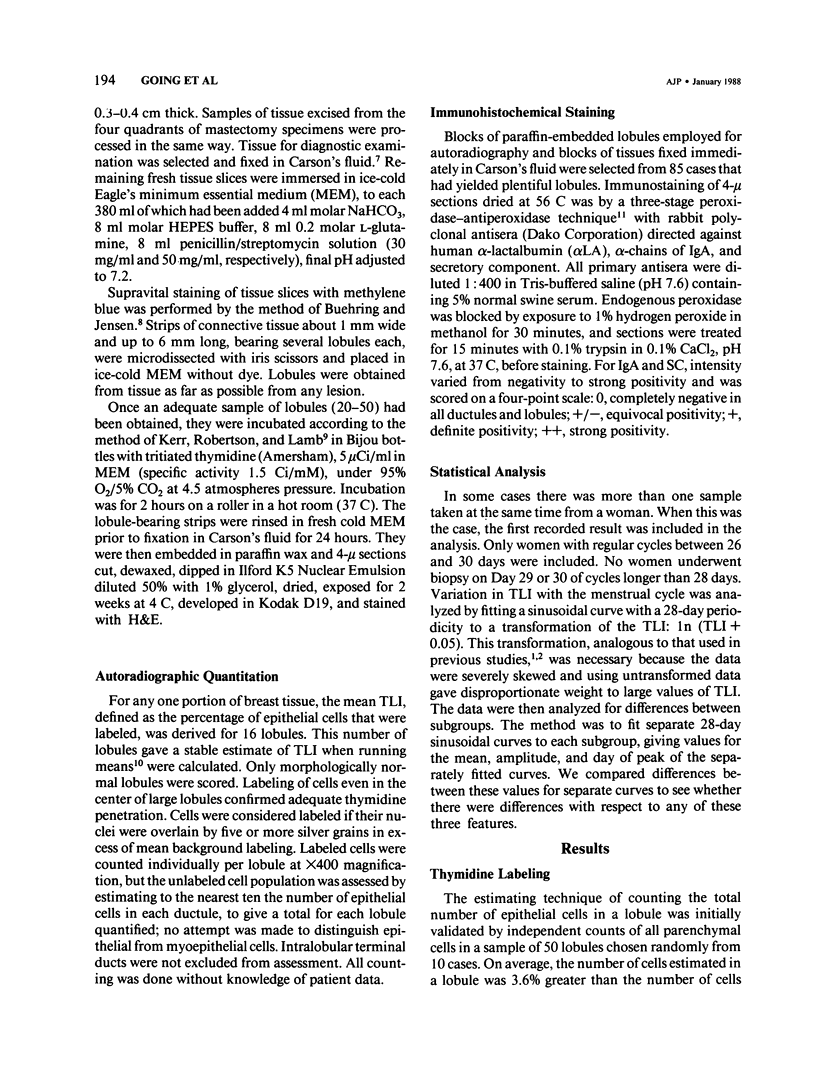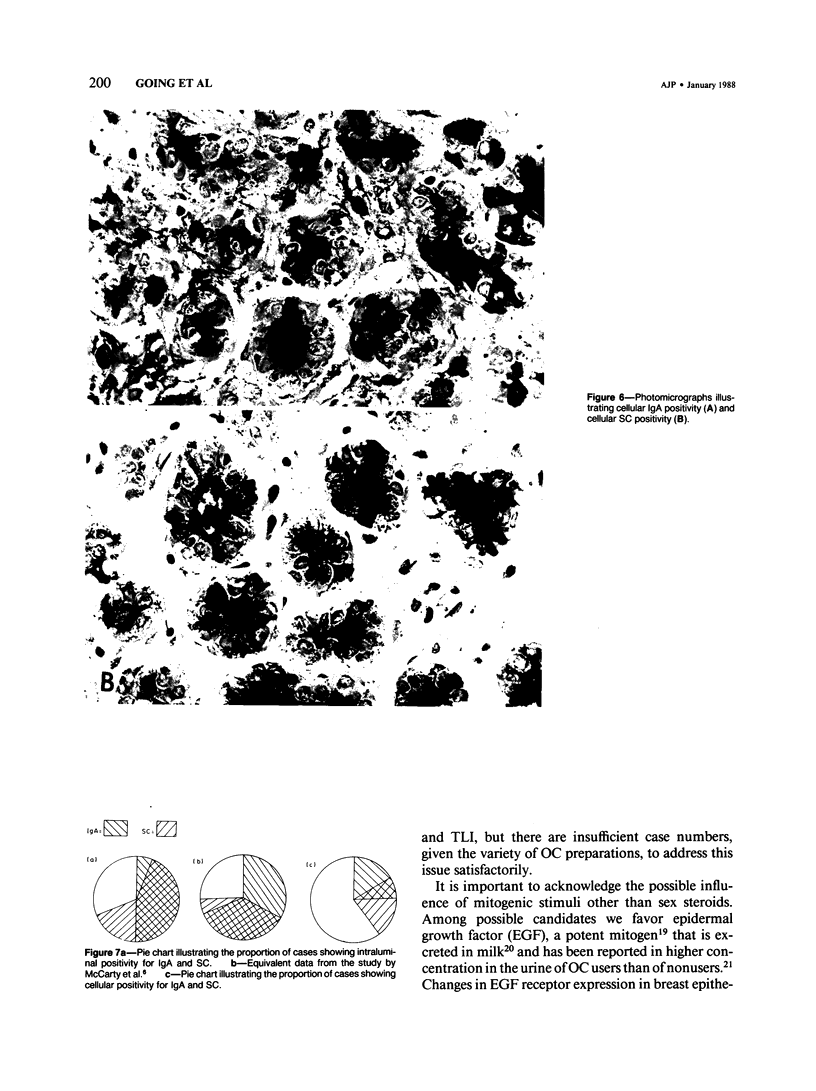Abstract
Events of cell proliferation have been assessed by thymidine labeling index (TLI) in morphologically normal breast lobules from women of reproductive age. TLI is higher during the second half of the menstrual cycle both in women with natural menstrual cycles and in those with artificial cycles due to oral contraceptive (OC) use. TLI varies between 0.04% and 5.7% and declines with increasing age. There is no difference in mean TLI between OC users and nonusers if correction is made for the difference in age distribution between these two groups. Immunohistochemical detection of immunoglobulin A (IgA), secretory component (SC), and alpha-lactalbumin shows more frequent positive staining during artificial than natural menstrual cycles, and positive staining tends to be associated with higher TLI values. No significant variation in staining with cycle phase is detected in natural or artificial cycles. These results show that breast tissue does not resemble endometrium in the relationships that exist between proliferation, secretion, and menstrual cycle phase.
Full text
PDF











Images in this article
Selected References
These references are in PubMed. This may not be the complete list of references from this article.
- Ahnen D. J., Brown W. R., Kloppel T. M. Secretory component: the polymeric immunoglobulin receptor. What's in it for the gastroenterologist and hepatologist? Gastroenterology. 1985 Sep;89(3):667–682. doi: 10.1016/0016-5085(85)90467-6. [DOI] [PubMed] [Google Scholar]
- Anderson T. J., Ferguson D. J., Raab G. M. Cell turnover in the "resting" human breast: influence of parity, contraceptive pill, age and laterality. Br J Cancer. 1982 Sep;46(3):376–382. doi: 10.1038/bjc.1982.213. [DOI] [PMC free article] [PubMed] [Google Scholar]
- Brandtzaeg P., Prydz H. Direct evidence for an integrated function of J chain and secretory component in epithelial transport of immunoglobulins. Nature. 1984 Sep 6;311(5981):71–73. doi: 10.1038/311071a0. [DOI] [PubMed] [Google Scholar]
- Buehring G. C., Jensen H. M. Lack of toxicity of methylene blue chloride to supravitally stained human mammary tissues. Cancer Res. 1983 Dec;43(12 Pt 1):6039–6044. [PubMed] [Google Scholar]
- Carson F. L., Martin J. H., Lynn J. A. Formalin fixation for electron microscopy: a re-evaluation. Am J Clin Pathol. 1973 Mar;59(3):365–373. doi: 10.1093/ajcp/59.3.365. [DOI] [PubMed] [Google Scholar]
- DUNNILL M. S. EVALUATION OF A SIMPLE METHOD OF SAMPLING THE LUNG FOR QUANTITATIVE HISTOLOGICAL ANALYSIS. Thorax. 1964 Sep;19:443–448. doi: 10.1136/thx.19.5.443. [DOI] [PMC free article] [PubMed] [Google Scholar]
- Dailey G. E., Kraus J. W., Orth D. N. Homologous radioimmunoassay for human epidermal growth factor (urogastrone). J Clin Endocrinol Metab. 1978 Jun;46(6):929–936. doi: 10.1210/jcem-46-6-929. [DOI] [PubMed] [Google Scholar]
- Damjanov I., Mildner B., Knowles B. B. Immunohistochemical localization of the epidermal growth factor receptor in normal human tissues. Lab Invest. 1986 Nov;55(5):588–592. [PubMed] [Google Scholar]
- Diczfalusy E. Mode of action of contraceptive drugs. Am J Obstet Gynecol. 1968 Jan 1;100(1):136–163. doi: 10.1016/s0002-9378(15)33651-6. [DOI] [PubMed] [Google Scholar]
- Ferguson D. J., Anderson T. J. Morphological evaluation of cell turnover in relation to the menstrual cycle in the "resting" human breast. Br J Cancer. 1981 Aug;44(2):177–181. doi: 10.1038/bjc.1981.168. [DOI] [PMC free article] [PubMed] [Google Scholar]
- Gospodarowicz D. Growth factors and their action in vivo and in vitro. J Pathol. 1983 Nov;141(3):201–233. doi: 10.1002/path.1711410304. [DOI] [PubMed] [Google Scholar]
- Joshi K., Smith J. A., Perusinghe N., Monoghan P. Cell proliferation in the human mammary epithelium. Differential contribution by epithelial and myoepithelial cells. Am J Pathol. 1986 Aug;124(2):199–206. [PMC free article] [PubMed] [Google Scholar]
- Kerr K. M., Robertson A. M., Lamb D. In vitro thymidine labelling of human pulmonary neoplasms. Br J Cancer. 1983 Feb;47(2):245–252. doi: 10.1038/bjc.1983.32. [DOI] [PMC free article] [PubMed] [Google Scholar]
- Longacre T. A., Bartow S. A. A correlative morphologic study of human breast and endometrium in the menstrual cycle. Am J Surg Pathol. 1986 Jun;10(6):382–393. doi: 10.1097/00000478-198606000-00003. [DOI] [PubMed] [Google Scholar]
- MAQUEO M., BECERRA C., MUNGUIA H., GOLDZIEHER J. W. ENDOMETRIAL HISTOLOGY AND VAGINAL CYTOLOGY DURING ORAL CONTRACEPTION WITH SEQUENTIAL ESTROGEN AND PROGESTIN. Am J Obstet Gynecol. 1964 Oct 1;90:395–400. [PubMed] [Google Scholar]
- McCarty K. S., Jr, Sasso R., Budwit D., Georgiade G. S., Seigler H. F. Immunoglobulin localization in the normal human mammary gland: variation with the menstrual cycle. Am J Pathol. 1982 Jun;107(3):322–326. [PMC free article] [PubMed] [Google Scholar]
- McManus M. J., Welsch C. W. The effect of estrogen, progesterone, thyroxine, and human placental lactogen on DNA synthesis of human breast ductal epithelium maintained in athymic nude mice. Cancer. 1984 Nov 1;54(9):1920–1927. doi: 10.1002/1097-0142(19841101)54:9<1920::aid-cncr2820540924>3.0.co;2-f. [DOI] [PubMed] [Google Scholar]
- Meyer J. S. Cell proliferation in normal human breast ducts, fibroadenomas, and other ductal hyperplasias measured by nuclear labeling with tritiated thymidine. Effects of menstrual phase, age, and oral contraceptive hormones. Hum Pathol. 1977 Jan;8(1):67–81. doi: 10.1016/s0046-8177(77)80066-x. [DOI] [PubMed] [Google Scholar]
- Pike M. C., Henderson B. E., Krailo M. D., Duke A., Roy S. Breast cancer in young women and use of oral contraceptives: possible modifying effect of formulation and age at use. Lancet. 1983 Oct 22;2(8356):926–930. doi: 10.1016/s0140-6736(83)90450-6. [DOI] [PubMed] [Google Scholar]
- Russo J., Calaf G., Roi L., Russo I. H. Influence of age and gland topography on cell kinetics of normal human breast tissue. J Natl Cancer Inst. 1987 Mar;78(3):413–418. [PubMed] [Google Scholar]
- Starkey R. H., Orth D. N. Radioimmunoassay of human epidermal growth factor (urogastrone). J Clin Endocrinol Metab. 1977 Dec;45(6):1144–1153. doi: 10.1210/jcem-45-6-1144. [DOI] [PubMed] [Google Scholar]
- Sullivan D. A., Wira C. R. Estradiol regulation of secretory component in the female reproductive tract. J Steroid Biochem. 1981 Dec;15:439–444. doi: 10.1016/0022-4731(81)90311-3. [DOI] [PubMed] [Google Scholar]
- Thomas D. B. Do hormones cause breast cancer? Cancer. 1984 Feb 1;53(3 Suppl):595–604. doi: 10.1002/1097-0142(19840201)53:3+<595::aid-cncr2820531304>3.0.co;2-y. [DOI] [PubMed] [Google Scholar]
- Vogel P. M., Georgiade N. G., Fetter B. F., Vogel F. S., McCarty K. S., Jr The correlation of histologic changes in the human breast with the menstrual cycle. Am J Pathol. 1981 Jul;104(1):23–34. [PMC free article] [PubMed] [Google Scholar]
- Wira C. R., Stern J. E., Colby E. Estradiol regulation of secretory component in the uterus of the rat: evidence for involvement of RNA synthesis. J Immunol. 1984 Nov;133(5):2624–2628. [PubMed] [Google Scholar]
- Wira C. R., Sullivan D. A. Estradiol and progesterone regulation of immunoglobulin A and G and secretory component in cervicovaginal secretions of the rat. Biol Reprod. 1985 Feb;32(1):90–95. doi: 10.1095/biolreprod32.1.90. [DOI] [PubMed] [Google Scholar]
- van Kooij R. J., Kathmann G. A., Kramer M. F. Secretory piece and plasma proteins in human cervical mucus during the cycle. J Reprod Fertil. 1983 May;68(1):63–68. doi: 10.1530/jrf.0.0680063. [DOI] [PubMed] [Google Scholar]






